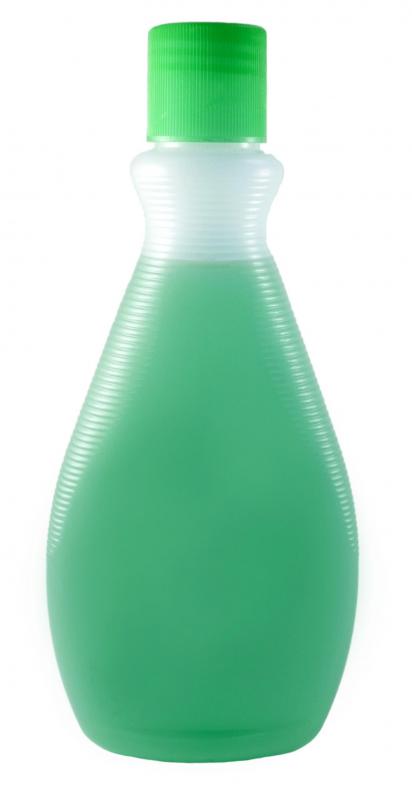At TheHealthBoard, we're committed to delivering accurate, trustworthy information. Our expert-authored content is rigorously fact-checked and sourced from credible authorities. Discover how we uphold the highest standards in providing you with reliable knowledge.
What Is the Effect of Acetone on Skin?
The chemical acetone can be found in many places, as it is produced both naturally by the human body and for industrial use, so there are many opportunities for it to come in contact with a person's skin. Small amounts of acetone typically do not cause any harm, though some of the chemical may absorb through the skin and enter the bloodstream. At higher concentrations, acetone on skin may cause dryness, redness, and irritation, and if contact continues long term, one may develop dermatitis. There may also be a risk to other tissues in the body if one is exposed to high levels of acetone, especially when it is done repeatedly.
Brief or minimal exposure to acetone on skin typically does not cause any ill effects and should not be a cause for concern. The human body itself naturally produces some acetone as a byproduct of the breakdown of fat. It is also produced in nature by plants and from certain other sources like forest fires, and many products and areas in the environment contain it due to its use as an industrial chemical.

The amount of acetone in the body can vary, with certain people like pregnant women or those who exercise producing more than usual. Most acetone can normally be metabolized and broken down within the body, while the rest is either breathed out or eliminated during urination. Therefore, a small amount on the skin, even if it is absorbed, will usually not cause any health problems.

Larger amounts of acetone applied directly to the skin can cause issues, however. Those who work with the chemical and come in direct contact with it in its pure form may find that it makes their skin very dry, as it will remove fats from the tissue. They may also find that the exposed areas become red or itchy. If the exposure continues, dermatitis may eventually develop from the chronic irritation.

Since acetone on skin can be absorbed into the bloodstream and carried to the rest of the body, it may cause other health issues when the exposure is significant or occurs frequently. Acetone can have effects on the central nervous system, and overexposure may cause symptoms like dizziness or drowsiness. It can cause headaches and nausea. Though the chances of absorbing extremely large concentrations from acetone on skin are highly unlikely, it should be noted that significant exposure has caused comas and even death.
AS FEATURED ON:
AS FEATURED ON:

















Discussion Comments
I soaked my nails in acetone to remove false nails. About an hour later my fingers became really itchy and swollen by the time I woke up this morning. I plan to see a doctor.
Acetone is safe if used in minimal amounts (smallest amount needed to do the job) and if used in a well ventilated room. Acetone evaporates fast- it feels like it is adsorbing into the skin but only tiny amount actually absorbs.
Put on a nitrile glove and splash a cc or two on the glove; it still feels like it is absorbing into the skin but it can't.
In small amounts, with reasonable precautions, and proper health care otherwise (don't smoke, drink excessively, or abuse drugs), acetone is incredibly useful in the home and light industry.
I spilled some nail polish remover on my hand today and noticed that my skin completely absorbed it in about 5 seconds. The main ingredient is acetone. Anyone know why this is?
@feasting: It's funny you say your aunt had reactions to nail products and had to change to hairdressing. I started in hairdressing, and with complications rising due to the chemicals in hair products, I had to change over to being a Nail Technician. I guess different people can have their own reactions to different products.
I hope that no one tries to remove fat from their body by spreading acetone on it. Just because acetone takes fat from tissues doesn't mean it's a good weight loss solution. I would imagine that putting this much acetone on your skin would cause a burning, dry rash.
@feasting – I will not use the stuff. I used it on my nails one time, and it did bad things to them.
My best friend uses acetone nail polish remover, so I borrowed some from her. It actually stripped the top layer of my nails off!
If it could do this to nails, I could only imagine what it could do to skin. I rinsed it off as soon as I could, so it didn't burn my skin or anything.
My aunt works in a nail salon, and she used to get bad headaches from the acetone she had to use on people's nails all the time. She inevitably got it on her fingers, too.
Also, the fumes made her sick. I have a feeling that they contributed to her headaches. She had to switch to doing hair instead of nails because of the acetone.
Post your comments